There are two methods of performing the upgrade, as follows:
Default installation
The following configuration is used without the need to input any values.
Installation destination
The "systemDrive:\ETERNUS_SF" directory is used as the root location for the Program Directory, Environment Directory and Work Directory.
Port numbers for the various communication services
9 port numbers are used, as follows.
Service | [Port Registration] Display Name | Port Number |
|---|---|---|
Web Console service | ETERNUS SF Manager Apache service | 9855 |
communication service 1 | Communications service 1 | 1226 |
communication service 2 | Communications service 2 | 4917 |
Repository service | Repository service | 15432 |
Internal use | Internal Port 1 | 28005 |
Internal Port 2 | 28009 | |
Internal Port 3 | 28443 | |
Internal Port 4 | 24916 | |
Internal Port 5 (No screen display) | 24917 |
Custom installation
The upgrade is performed by manually entering the configuration information into the interface (installation destination and communication service port numbers).
The upgrade procedure is as follows:
Note that if step 1 and step 2 have already been performed, perform from step 3.
Log on to the server using Administrator privileges.
Insert the DVD "ETERNUS SF SC/ACM/Express Mediapack for Windows (V16.9 or higher) Manager Program (1/2)" of this version into the DVD drive.
The following window is displayed. Click Manager installation.
To cancel the upgrade at this point, click Exit.
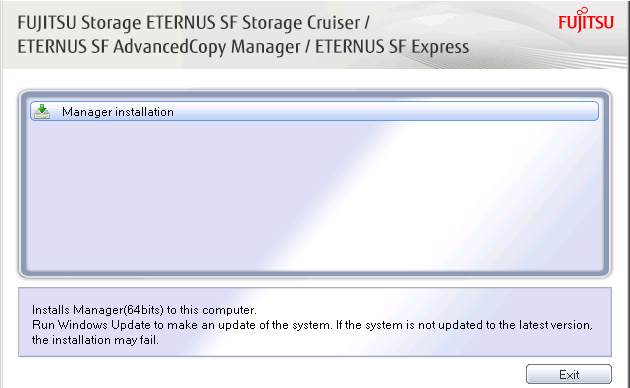
The following dialog box is displayed. Select the appropriate language and click OK.
The language selected in this dialog box is used during installation and uninstallation.
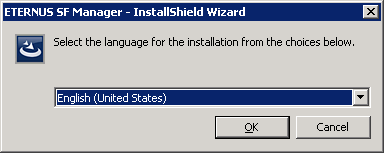
The following progress bar is displayed. To cancel the upgrade, click Cancel.
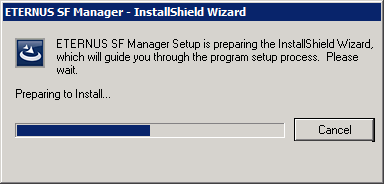
The installation wizard page is displayed. Click Next.
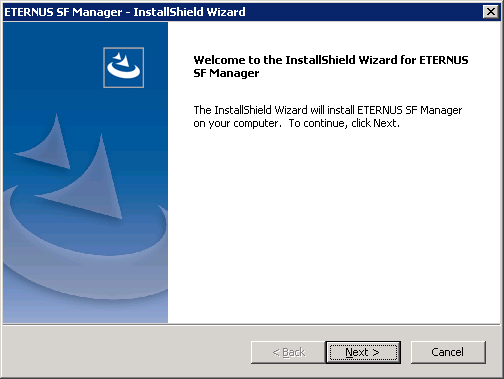
Read the terms and conditions of the License Agreement page.
If the conditions are agreeable, select [I accept the terms of the license agreement] and then click Next.
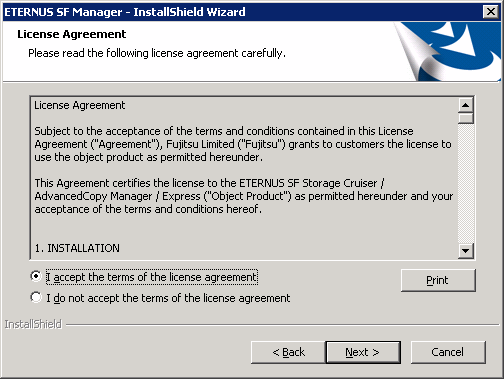
Select the features and options to install from the Install option page. Confirm the IP address of the Management Server that is displayed and perform a customized installation if it is necessary to make changes.
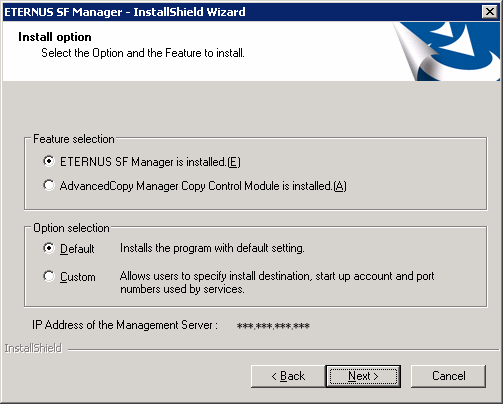
Select [ETERNUS SF Manager is installed.].
Select the desired options according to the following information.
Install Option | Explanation |
|---|---|
Default | Changing values in the Installation Destination page and Port Registration page is optional. In this case, steps 9 and 10 can be skipped. For this installation method, the following checks are automatically performed relating to the information provided by default:
If an error is detected at this stage, a warning dialog box is displayed. |
Custom | The installation information must be manually entered in the pages for step 9 and later. |
Specify the installation directory in the Installation Destination page.
If installing to a directory other than the default directory, click Browse and change the install destination. After designating all of the directories, click Next.
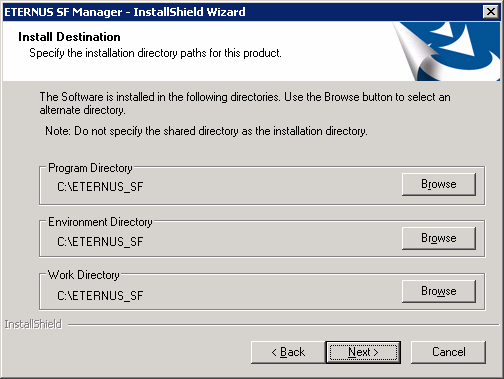
Point
Do not specify the shared directory as the installation directory.
Spaces and the characters " | : * ? / . < > , % & ^ = ! ; # ' @ ( ) + are not supported for directory names.
The number of characters in a directory name must be between 4 and 70.
Specify the port number for the services in the Port Registration page.
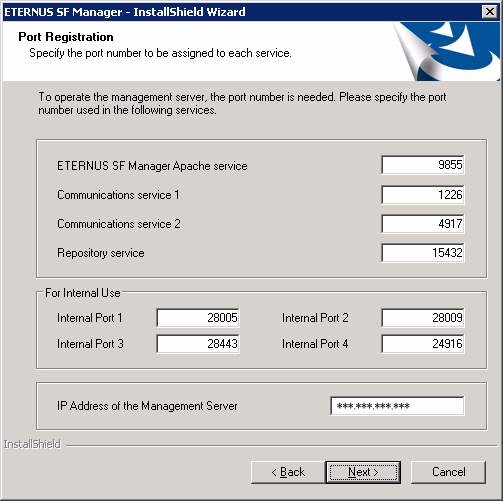
The default values are displayed. If necessary, enter alternative port numbers suitable for your environment. Values between 1024 and 65,535 are valid.
To change the port number of Internal Port 5, edit the %SystemRoot%\system32\drivers\etc\services file by manual and define the unused port number under the following service name and in the range of 1024 - 65535.
Service Name | Receive Port | Purpose |
|---|---|---|
astm | 24917/tcp | Use for internal communication. |
Enter the IP address of the Management Server (local system).
Specify Internet Protocol address referring to the following.
When you use only the IPv4 address with the Management Server:
Set the IPv4 address used.
When you use only the IPv6 address with the Management Server:
Set a temporary IPv4 address (127.0.0.1 for instance).
The following operations are executed after the Upgrade Installation is completed and the IP address version of the Management Server is changed to IPv6.
Create a server information change instruction file on the Management Server. Describe only the IPv6 address as the IP address after it changes in the server information change instruction file.
Execute the stgxfwcmmodsrv command with the -f option.
programDir\ACM\bin\stgxfwcmmodsrv -f serverInformationChangeInstructionFileName
When you use both the IPv4 and IPv6 addresses with the Management Server:
Set the IPv4 address used.
The following operations are executed after the Upgrade Installation is completed and the IPv6 address is added as the IP address of the Management Server.
Create a server information change instruction file on the Management Server. Describe both the IPv4 and the IPv6 addresses as the IP address after it changes in the server information change instruction file.
Execute the stgxfwcmmodsrv command with the -f option.
programDir\ACM\bin\stgxfwcmmodsrv -f serverInformationChangeInstructionFileName
Information
Refer to "Changing the IP address of Management Server" in the AdvancedCopy Manager Operation Guide (for Windows) for this version for the update procedure of IP address information.
Refer to "stgxfwcmmodsrv (Server information change command)" in the AdvancedCopy Manager Operation Guide (for Windows) for this version for information on the command.
Point
When the Management Server has multiple IP addresses, specify an IP address that can communicate with the Management Server from all of the AdvancedCopy Manager's agents.
Then, click Next. If an entered value is already being used, the page is displayed again.
Check the settings information in the Start Copying Files page.
If the settings are correct, click Next.
To change a setting, click Back.
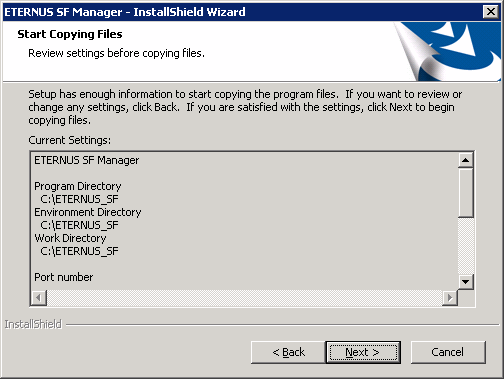
The following dialog box is displayed. To proceed with the uninstallation, click Yes.
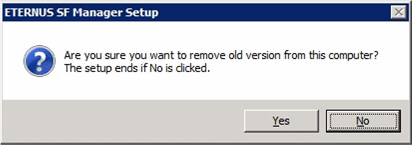
When the uninstallation is completed, the copying of the files for the new version is started.
During this process, the file copy completion status is displayed in the Setup Status page.
When the copying process is completed, the system configuration is updated. Wait for the configuration update process to complete.

The following installation wizard page is displayed. The upgrade process is completed. Click Finish.
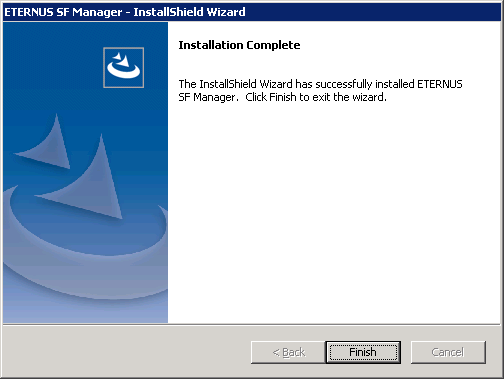
Eject the DVD media used for the Upgrade Installation from the device.
The upgrade is complete above.
Return to the section where this item was referenced to continue tasks.